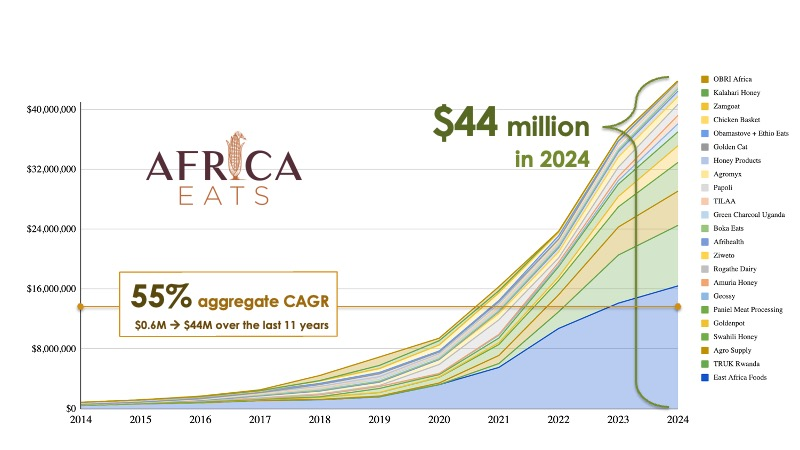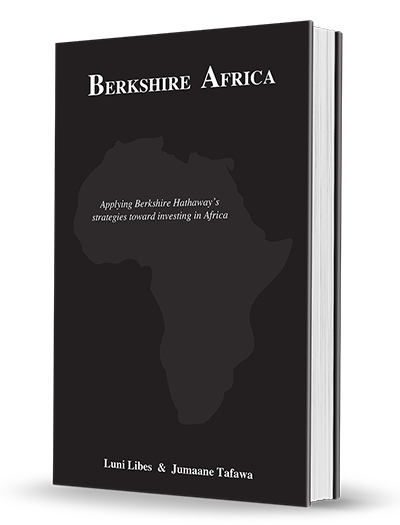“1.5 billion people need to eat. And they can’t eat software.”
Startups are shutting down.
VCs are retreating.
And in the middle of the chaos, one company quietly pulled off 125x growth in just 11 years.
No, it’s not in tech.
Not in solar.
And no, Aliko Dangote doesn’t run it.
Meet Africa Eats
Africa Eats started as a quirky experiment:
In 2014, an accelerator called Fledge raised $200k to bet on a handful of impact businesses. Some of the best performing investments were food businesses in Africa.
That bet spun out into Africa Eats, which went public in December 2024 at a $25 million valuation.
That’s 125x growth.
I joined the party late in 2021 but still walked away with 31% IRR—a return most investors would die for.

But how?
If such an opportunity truly existed, someone would have snatched it up already.
I Saw It From the Inside
After investing, I worked directly with four Africa Eats portfolio companies aka “bizi”.
And what I found shocked me.
It was so obvious.
So simple.
No fancy apps.
No buzzwords.
Just profitable, “boring” businesses selling food, Africa’s most resilient and fastest-growing sector.
And the impact?
- •23 businesses
- •15 millionaires minted (the founders)
- •Thousands of jobs created
- •$68m+ paid to 30,000+ smallholder farmers
And the people behind it? A serial entrepreneur from Silicon Valley so contrarian that he prefers the nickname “Luni” over his birth name:

And Jumanne (“Tuesday” in Swahili), a Kenyan-Nigerian-Guyanan-American Entrepreneur who “unschooled” his children in tens of countries.

When Steve Jobs said, “Here’s to the crazy ones. The rebels. The misfits. The round pegs in the square holes,” he was talking about Africa Eats.
Why Did Their Model Work?
Africa Eats took a radically different path from traditional investment firms. Rather than flipping companies within 5 to 10 years like a used car, they borrowed Warren Buffet’s “forever structure.” The plan? Never sell. Their favorite holding period is forever, and with portfolio companies growing 55% year-on-year, why would they?
This long-term approach built trust. Founders didn’t just receive funding; they gained a committed partner. One founder review on sunlight.reviews even called them “the best investors I’ve ever worked with.”
In addition, trust enabled speed. Because of these strong relationships, Africa Eats could deploy working capital within three days of a business receiving a large purchase order. In contrast, most funds take anywhere between 3 – 12 months just to respond.
However, this model isn’t for everyone. The Africa Eats network is intentionally tight- more like a club than a conventional accelerator. Those inside? Thriving. Those outside? Wishing they were invited to the party.

At the heart of their model is first-principles thinking: 1.5 billion people need to eat, and they can’t eat software. Africa Eats backs real businesses solving real problems.
Crucially, they back founders who don’t quit. They’re not obsessed with glossy five-year financial models. They support local founders who are all in. Unlike foreign founders who often have the safety net of six-figure jobs back home, African entrepreneurs don’t have the luxury of failure. Therefore, they build relentlessly.
So Why Isn’t Everyone Doing This?
Most investors in Africa aren’t trying to make money.
Wait, what?
Around 80% of African VC funding comes from foreign governments.
The rest? Mostly philanthropic foundations.
These “investors” get:
- •No bonus for generating returns = misaligned incentives
- •Tangled in bureaucracy
- •Addicted to conferences
No time for innovation.
Meanwhile, get-rich-quick investors want to write $10m checks.
Others raise huge funds to soothe their egos as a status symbol to brag about who has a bigger…fund.
Eats proved that the best deals are $40,000 + patience.
As Berkshire partner Munger said, “The best moat is just to be patient.”
Legal Innovation > Tech Innovation
Everyone’s obsessed with technical innovation.
But in frontier markets, legal innovation matters more.
Consider this:
The company itself was a legal innovation, so The Crown didn’t have to personally bankroll colonialism. (The Queen chartered the British East India Company—don’t let that trigger you—that’s just how it is.)
The 2-and-20 VC model?
A legal structure from the 1950s. That’s last-century thinking.
Africa Eats rewrote the rules. Literally.
They:
- •Helped draft new rules for the Stock Exchange of Mauritius
- •Launched the SEM X Board, tailored to high-growth African businesses
- •Created Tuesday Markets, Mauritius’ first market maker to ensure liquidity
- •Gave away the “secret sauce” in their book

Meanwhile, Impact VC dinosaurs are 20 years behind, running 2-and-20 solar-power funds like it’s 2005—John Doerr’s infamous mistake at Kleiner Perkins (worth chatGPT’ing if you don’t know the reference—heck, paste this whole article into ChatGPT to fact check that this is indeed a crazy but true story).
Everyone knows the old playbook isn’t working. But it’s a trainwreck no one can look away from.
Meanwhile…
“Bad boys move in silence.”
— Notorious B.I.G., Rule #2
Africa Eats has been quiet. But they won’t be able to fly under the radar for long.
A Cambrian Explosion of Funds Is Coming
Africa Eats isn’t a one-off.
It’s a glimpse of what’s next.
New fund structures are coming: leaner, faster, founder-aligned. Legal innovation. Capitalism is nothing if not ruthlessly exploiting profitable opportunities.
When I saw it, I couldn’t help myself.
We built on the blueprint with Kuzana.co:
- •Free accounting + sales support
- •Growth-first (impact second)
- •Focus on key markets like Kenya. Maybe Malaysia and beyond one day.
- •New legal innovations I can’t disclose yet.
Kuzana is one. There will be innovations.
“Vanilla” Capital Is Dying
Copy-pasting Silicon Valley models to Africa clearly hasn’t worked.
Africa doesn’t need unicorns.
We need millions of elephants: real businesses solving real problems and printing real profits.
Food. Logistics. Manufacturing.
Quiet giants.
Legal innovation.
125x growth.
Kyle Schutter is a digital nomad who “herds” capital for high growth African companies. He’s Managing Partner of Grant&Co and writes at African Accelerationism. Reach out to him on Twitter @kyleschutter.




